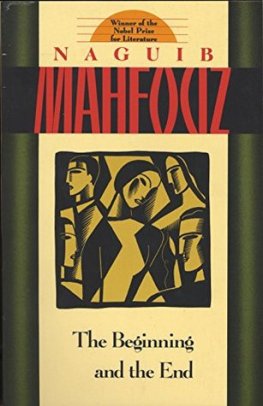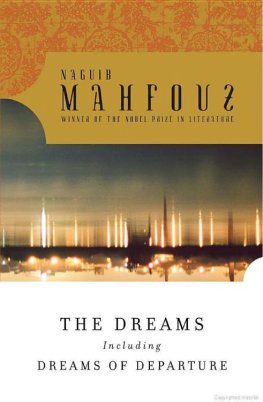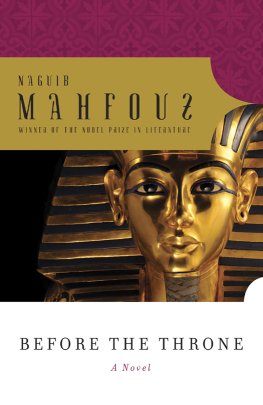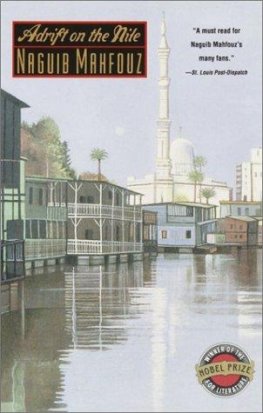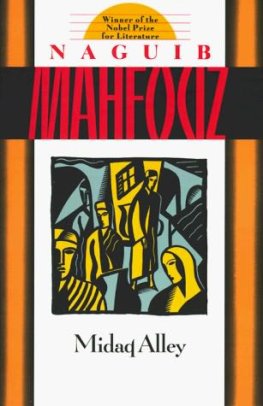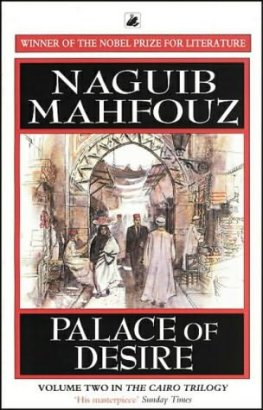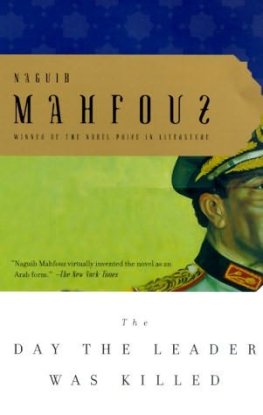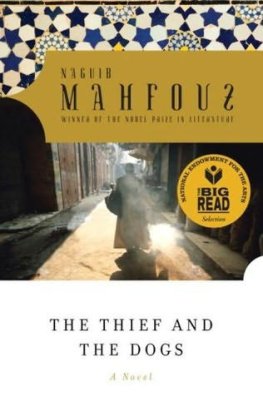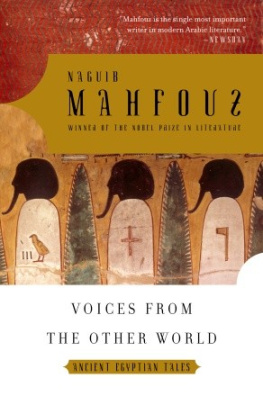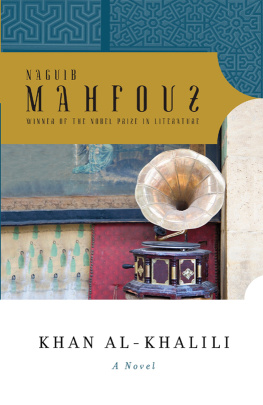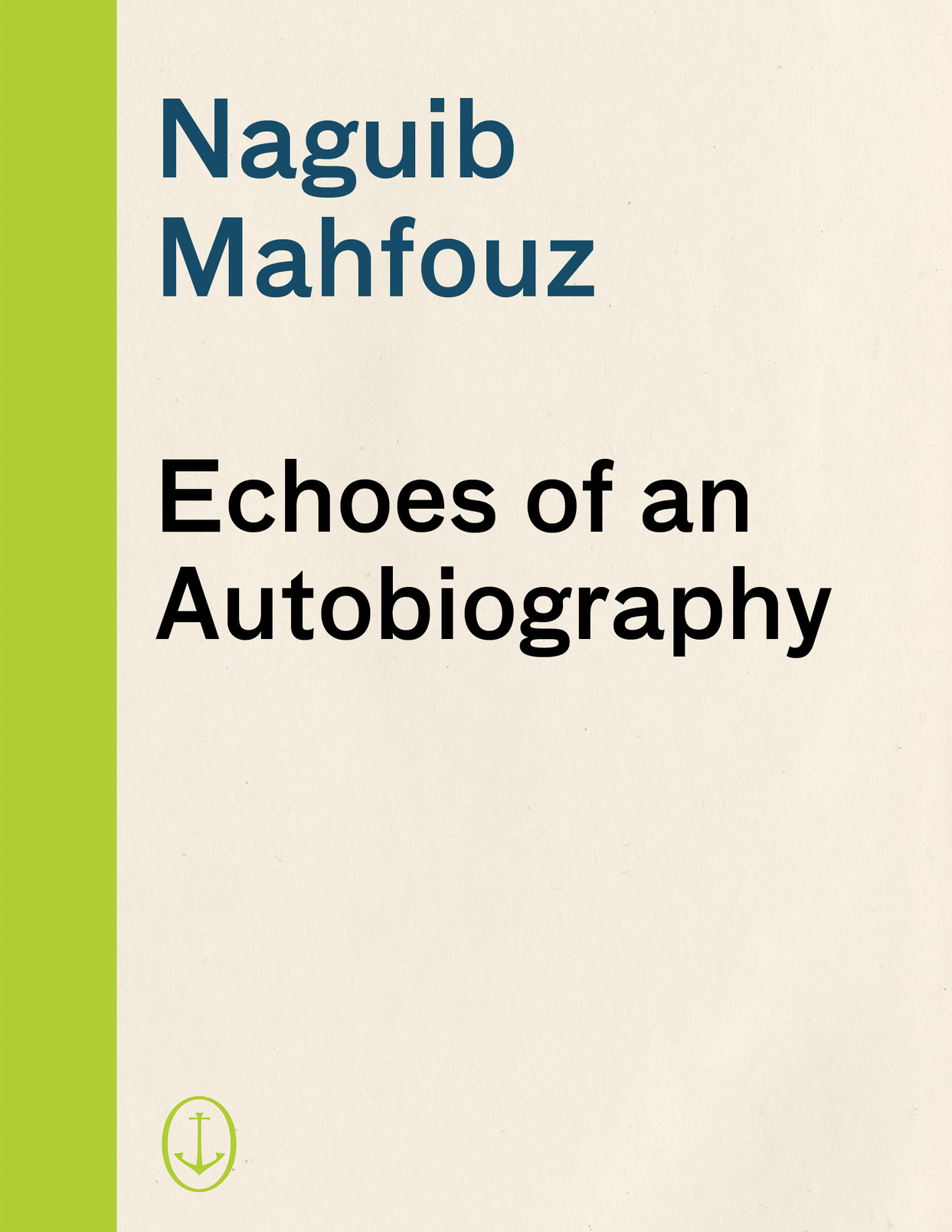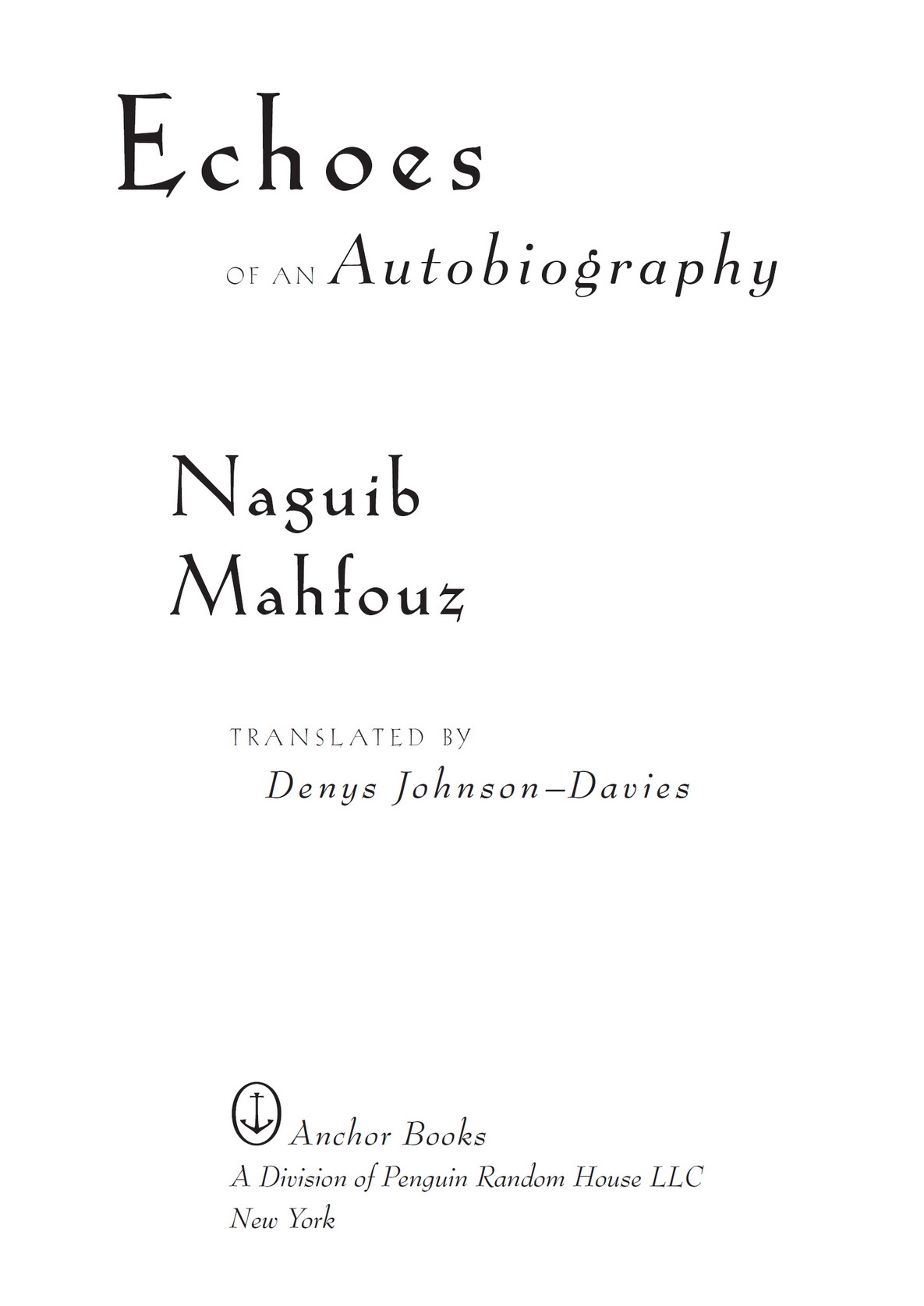Contents
Contents
F IRST A NCHOR B OOKS E DITION , J ANUARY 1998
Copyright 1994 by Naguib Mahfouz
English translation copyright 1997 by The American Universty in Cairo Press
Foreword copyright 1997 by Nadine Gordimer
All rights reserved under International and Pan-American Copyright Conventions. Published in the United States by Anchor Books, a division of Random House, Inc., New York, and simultaneously in Canada by Random House of Canada Limited, Toronto. Originally published in Egypt by The American University in Cairo Press in 1997 and in hardcover in the United States by Doubleday in 1997. The Anchor Books edition is published by arrangement with Doubleday, a division of Random House, Inc.
A NCHOR B OOKS and colophon are registered trademarks of Random House, Inc.
First serialized in Arabic in al-Ahram in 1994 as Asdaa al-sira al-dhatiyya. Protected under the Berne Convention.
The Library of Congress has cataloged the hardcover edition of this book as follows:
Maf, Najb
Echoes of an autobiography / Naguib Mahfouz; translated by Denys Johnson-Davies.
p. cm
First serialized in Arabic in al-Ahram in 1994 as Ad al-srah al-dhtyahCIP t.p. verso.
1. Maf, Najb, 1912 Biography.
2. Authors, ArabEgyptBiography.
I. Johnson-Davies, Denys. II. Title.
PJ7846.A46Z463 1997 892. 736dc20
[B] 96-12386
ISBN9780385485562
eBook ISBN9780525431657
www.anchorbooks.com
v4.1
a
F OREWORD
The Dialogue of Late Afternoon
N ADINE G ORDIMER
I have visited Egypt three times in my life and have never met Naguib Mahfouz. The first times, 1954 and 1958, I had not heard of him or his work; by the third time, 1993, all his work available in English translation was deeply familiar to me and counted, in my canon, as part of the few great international contemporary literary achievements. In 1993 I had asked my kind hosts to arrange for us to meet, but in their zeal to make me welcome they planned for this to happen at a large gathering with other Egyptian writers, and Naguib Mahfouz, by temperament and in the deserved privacy of old age, does not attend such public events. My days in Cairo were few and there was not time to seek another opportunity. It does not matter. The essence of a writers being is in the work, not the personality, though the world values things otherwise, and would rather see what the writer looks like on television than read where he or she really is to be found: in the writings.
I am inclined to believe that a similar valuation may be applied to autobiography. The writers gift to fellow humans is his or her gifts, the bounty of the creative imagination which comes from no one knows where or why. The persona of the writer is the vessel. Whether it is flamboyantly decorated by a lifestyle of excess in alcoholism, adventurism, sexual experiment, or whether it is sparsely chased by what appears to be domestic dullness, its content has been poured into the work; the truth of it is there. (Sometimes in spite of the author) Of course there are exceptions, but in general fiction writers who produce autobiographies are those whose autobiographies are better than their novels. Which has something to indicate about the limitation of their gifts. Let the biographers trace the chronology of life from the circumstances of the birth to the honoured or forgotten grave. What that span produced is already extant, transformed, freed from place and time.
The aphorisms, parables, allegories in this work of Naguib Mahfouz have no dates appended. Its of no account when he wrote them. The back-and-forth of a mind creating its consciousness expands and contracts, rather than roves between past and present, with a totality which is not merely memory. Indeed, with the wry humour that flashes through profundity in all his thinking, Mahfouz meets memory as an enormous person with a stomach as large as the ocean, and a mouth that could swallow an elephant. I asked him in amazement, Who are you, sir? He answered with surprise, I am forgetfulness. How could you have forgotten me? The totality is the comprehension of past and present experience as elements which exist contemporaneously. These pieces are meditations which echo that which was, has been, and is the writer, Mahfouz. They arein the words of the title of one of the prose piecesThe Dialogue of Late Afternoon of his life. I dont believe any autobiography, with its inevitable implication of self-presentation, could have matched what we have here.
If the prose pieces have no dates they do each have a title, and these in themselves are what one might call the essence of the essence of Mahfouzs discoveries in and contemplation of life. The preoccupations so marvelously explored in his fiction appear almost ideographically (if this is not an unacceptable oxymoron!), the single word or phrase standing for morality, justice, time, religion, memory, sensuality, beauty, ambition, death, freedom. And all these are regarded through a changing focus: narrowing briefly to the cynical; taking the middle distance of humour and affection; opening wide to reverence. Prompted by his own wordsanother title, The Train of the UnexpectedI take the liberty of paraphrasing myself in what I have remarked elsewhere of Mahfouz: he has the gift of only great writers to contemplate all the possibilities inherent in life rather than discard this or that awkwardness for consistency. The stimulus of his writing comes from the conflict of responses he elicits.
In A Man Reserves a Seat a bus from a working-class suburb and a private car from a wealthy one set out for Cairos station at the same moment, and arrive at the same time, colliding in an accident in which both are slightly damaged. But a man passing between the two is crushed and dies. He was crossing the square in order to book a seat on the train going to Upper Egypt. As one reads this laconic concluding sentence, almost an aside, the title suddenly leaps out, heavy type, in all the complexity of the many meanings it may carry. I read it thus: rich and poor arrive at the same point in human destiny whatever their means. Even the man who travels with neither, seeking to pass between the two, cannot escape; you cannot reserve a seat in destiny. There is no escape from the human condition; the final destination of which is death.
Naguib Mahfouz is an old man and it would be natural for him to reflect on that destiny/destination, inescapable for believers and unbelievers alike. But those of us who know his work know that he always has had death in mind as part of what life itself is. We are all formed by the social structures which are the corridors through which we are shunted, and it is a reflection of the power of bureaucracy, the Egyptian civil service as regulator of existence and the height of ambition for a prestigious career, that his allegory of death should be entitled The Next Posting. The question with which the allegory ends is one he may be asking himself now, but that he has contemplated for his fictional characters much earlier: Why did you not prepare yourself for it when you knew it was your inevitable destiny? It is saidperhaps


